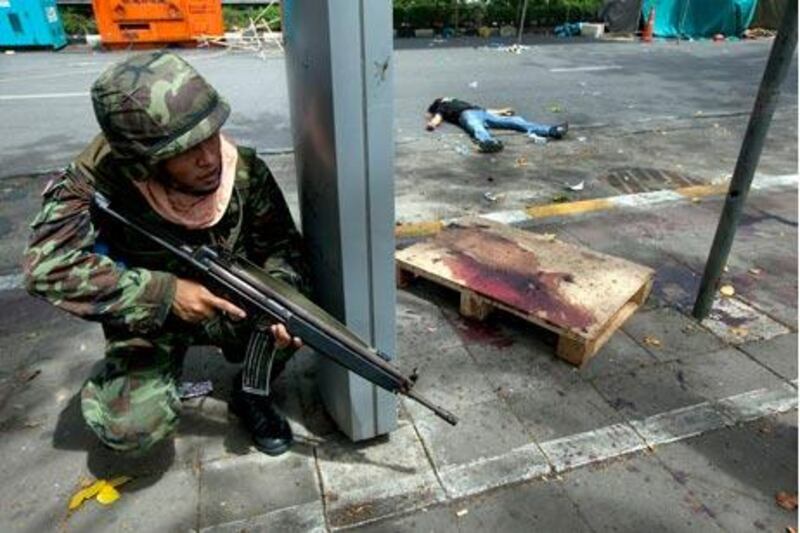BANGKOK // Thailand's capital resembled a war zone yesterday after security forces stormed the opposition Red Shirt's camp in the city centre, killing at least six people, injuring scores and forcing most of the group's leaders to surrender. Angry Red Shirt supporters then went on a rampage, burning buildings, smashing shop windows and attacking cars.
There were also reports of violence in several other provinces around the country. The government imposed a curfew from 8pm last night to 6am this morning in Bangkok and 23 other provinces, out of a total of 76, in order to limit disturbance. It also implemented a partial media blackout on local TV stations, saying they will have to air government-prepared bulletins. Clouds of thick black smoke billowed across the skyline, most of them from piles of rubber tyres the protesters had used as barricades before setting them alight to impede the soldiers advance.
At least 20 buildings were burning last night, according to the city's fire department. Central World - one of South East Asia's largest shopping malls - Thailand's Stock Exchange, a theatre in Siam Square and a bank in the city centre were all set on fire. A military-run TV station, Channel 3, was surrounded and its staff inside held hostage by Red Shirts. "This is always what we feared, the protesters venting their anger at symbols of their discontent," the Thai finance minister, Korn Chatikavanij said in a phone interview. "We had always been careful not to be provoked."
The Red Shirts, so-named because of the colour of the clothes they wear, are from predominantly poor rural and urban areas. Most of them are supporters of the fugitive former prime minister Thaksin Shinawatra who was overthrown by a military coup in 2006 and is living in self-exile abroad. The movement is opposed to the country's wealthy ruling elite who they blame for their poverty and lack of opportunities.
"It's going to get worse through the night," said one Red Shirt supporter, Pichai Onwong, a 28-year-old taxi driver. "The whole of the country is going to go up in flames because we are angry at the soldiers." Town halls in the north-eastern provinces of Khon Kaen, Mukdahan, Ubon Ratchathani and Udom Thani and Chiang Mai were attacked by local Red Shirt supporters, according to Thai TV. Two protesters were shot dead in Ubon, according to TV reports. These areas are all strongholds of the anti-government activists.
"I cry for my country, what has it come to?" said 22-year-old Niratchai Sunthonsak, an accounting student. "But when they arrest our leaders ... we had no alternative but to show this government how upset we feel." "This is the government's fault. See our leaders surrendered to save lives, but the soldiers are still shooting Red Shirts." The military moved against the Red Shirt camp in the heart of Bangkok's commercial area early yesterday morning after days of warning the protesters there to disperse. When they breached the heavily fortified camp - which has been there for more than nine weeks and brought the city to a standstill - at least six people were killed in the ensuing fighting, including an Italian journalist, and scores were injured.
Several key Red Shirt leaders surrendered to the authorities in the early afternoon and asked their supporters to disperse, but many were angered and took matters into their own hands. Sporadic gunfire could be heard last night near to the site of the camp. Small gangs of Red Shirts were still roaming the streets, dodging soldiers who have been ordered to shoot troublemakers on sight. "I apologise to you all, but I don't want any more losses. I am devastated too," a key Red Shirt leader, Jatuporn Prompan, told his supporters from the stage before he was led away by the authorities.
At least 1,000 anti-government protesters, mainly women and children, have taken sanctuary in a nearby temple. The past week has witnessed continuous violence in Bangkok after the assassination of a renegade general who supported the Red Shirt cause. His shooting sparked skirmishes between the security forces and the protesters that left more than 40 people dead and hundreds injured. The Red Shirts' occupation of central Bangkok may be over, but the country's political crisis is far from finished.
"Just because we surrender to the authorities doesn't mean we have lost," the protest leader Jatuporn Prompan said just before surrendering to the police. "We will fight again." Kevin Hewitson, the director of the Carolina Asia Center at the University of North Carolina, said: "This messy army crackdown will not be the end. It's likely to be the beginning of a new phase. The rifts and divisions now in Thai society will be difficult to heal."
The government seems to believe that a political solution is still possible. "The prime minister proposed a road map," said the government spokesman Panitan Wattanayagorn. Part of this road map is elections, tentatively schedule for mid-November. But most analysts are sceptical that this will do anything more than provide a temporary calm. "Elections could release the pressure, at least temporarily," said Suranand Vejjajiva, a political columnist. "But all sides will have to agree to accept the results to make it work in the long run."
foreign.desk@thenational.ae





